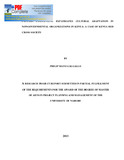| dc.description.abstract | The increasing globalization of the world requires new measurements for businesses if they are to succeed in the international market. Cultural gaps have a great effect on the difference between living and working in one’s home country and abroad. The study was based on expectancy and motivation theories, which states that international migration depends on standard components of individual capital as age, gender, education, skill, experience, marital status, as well as on personality features (ambition to succeed, entrepreneurial spirit, or a willingness to take risks by changing language, culture, and social environment). The research objective of this study was to determine factors influencing expatriate cultural adaptation at the Kenya Red Cross Society. The research design employed in this study was descriptive survey design. Data was collected from the expatriate Executives, Managers and Supervisors in the organization using questionnaires. Data was analyzed using descriptive statistics whereby frequencies, percentages, mean and standard deviations, generated from the various data categories were computed and presented in tables. The study established that the most significant aspects of cultural training were that expatriates are satisfied with the cultural training provided by the organization, expatriates are satisfied with participation in many local community events and that expatriates are satisfied with the duties of the job during the assignment. The study established that majority of the respondents stayed with their spouse/partner during the assignment. This depicts that the majority of the expatriates valued their families and thus opted to stay with their spouses/partners during the assignment to enhance the cultural adaptation. The study established that reward and compensation affect expatriate adaptation to a great extent. The study recommends review of the existing policies
and laws on reward and compensation of the expatriates with a view to ensure that they meet the prevailing international markets rates to retain the expatriates in the organization. The study also recommends that the organization should offer a high quality cultural training to the expatriates coupled with efforts of integration with the local community to maximize their cultural adaptation in Kenya. | en |

